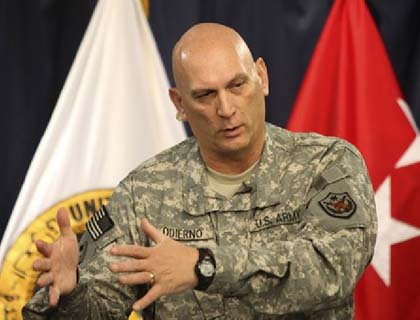WASHINGTON - The US Army's top general on Friday endorsed plans to reduce the size of his force by 80,000 soldiers over the next six years, pledging a steady drawdown that would take care of troops and their families rather than "running our nation's Army off a cliff."
General Ray Odierno, the Army chief of staff, said the drawdown would begin this year and take place mainly through attrition. It would include withdrawal of two heavy infantry brigades from Europe, one in 2013 and another in 2014, both of which would be removed from the force rather than relocating to the United States.
"With the successful completion of our mission in Iraq ... and the ... reduction of U.S. presence in Afghanistan, our strategy calls for us to no longer plan for large scale stability operations," Odierno said. "Accordingly the time is strategically right to reduce the Army's force structure."
His remarks came a day after Defense Secretary Leon Panetta previewed a budget plan for the 2013 fiscal year that calls for shrinking the size of the military to cut spending by $487 billion over a decade and refocus U.S. national security strategy toward Asia Pacific and the Middle East.
U.S. ground forces - the Army and Marine Corps - will take some of the heaviest cuts, with the Army slated to drop from a wartime peak of 570,000 in 2010 to 490,000 by the end of 2017. The Marine Corps would be reduced from about 202,000 to about 182,000 over the same period.
"This is not about winners and losers. This is about coming up with the right joint force," Odierno said. He noted that the Army had grown more than the other services over the past decade as the United States ramped up its involvement on the ground in Iraq and Afghanistan.
GRADUAL REDUCTION
Odierno said he was comfortable with pace of the planned reduction, which he said would be spread over six years and would allow the military to "walk down this hill at the ready rather than running our nation's Army over a cliff."
"We will follow a drawdown ramp that allows us to take care of soldiers and families while maintaining a ready and capable force to meet any requirements, including our current operations in Afghanistan," he said.
Personnel costs are one of the biggest budget items for the Army. Odierno told reporters this week that the service spent $41 billion on salaries, benefits and selected bonuses in 2011, up 88 percent from the $22 billion it paid in 2000.
Personnel costs now account for about 50 percent of the Army's total budget, up from between 41 percent and 45 percent in 2000.
"The cost of military personnel has grown at an ... unsustainable rate over the last decade," Odierno said. "We will not reduce pay, but reductions must occur in the rate of growth in military compensation and other personnel related costs and benefits."
He said he did not believe the Army would be significantly affected by the Pentagon's decision to ask Congress for a review of whether the military should close or consolidate more bases around the United States.
The issue is politically explosive and economically painful for local communities. Three lawmakers, including independent Senator Joe Lieberman, declared on Thursday that the proposal would be "dead on arrival" in Congress.
"The Army went through a very significant BRAC (base realignment and closure process) here not too long ago and we did a fairly significant consolidation," Odierno said. "We think we have the right footprint."
General Norton Schwartz, the Air Force chief of staff, said his service probably would have to shutter bases in any new round of consolidation and closure. He said the Air Force had not closed bases in 2005, the last time the Pentagon went through the process.
A report at that time estimated the Air Force had excess infrastructure of about 20 percent, Schwartz said. Since then its inventory of aircraft has shrunk by an additional 500 planes.
"I think our expectation is that we would actually close bases in a future base closure round," Schwartz said. (Reuters)

